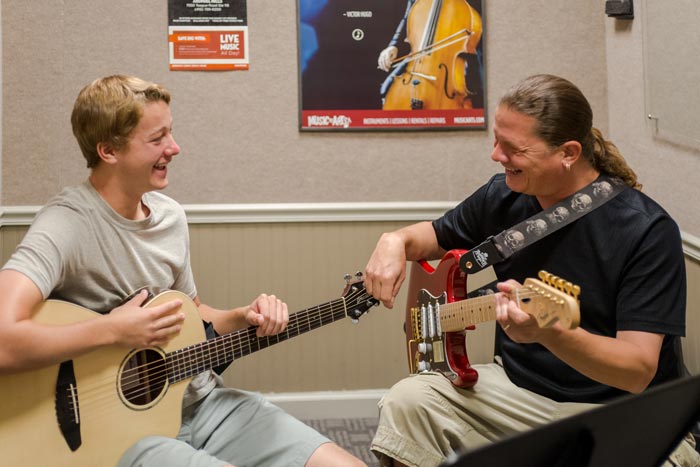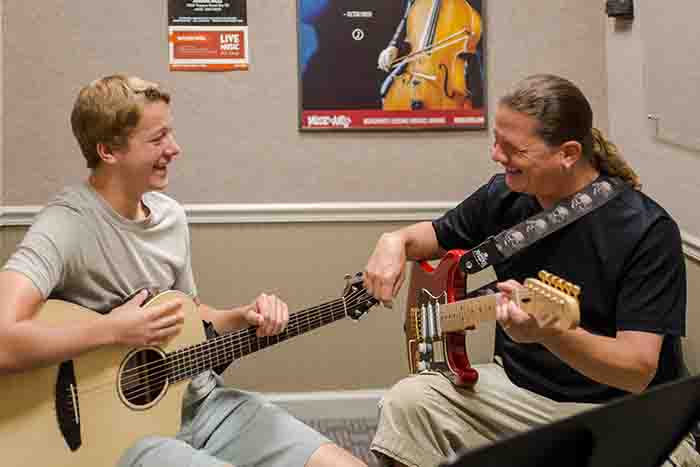May 13, 2015
The Business of Teaching Music


The Business of Teaching Music
By Eric Klodt
Over the past fifteen years, as a full time music instructor, I have observed many amazing music professionals who are great teachers and players, but struggle to maintain a full studio. I believe some fundamental business practices are what these teachers display an opportunity to improve on. Below, I will offer a few insights into the skills I believe have allowed me to excel where others seem challenged.
The following ideas I have acquired through a degree in small business management and several years in sales, management, and marketing before I decided to return to school for music and peruse a teaching career.
- Early Bird gets the worm. I arrive at Music & Arts usually an hour before my first lesson. This allows me to catch up on the daily goings on of the particular store I teach in and preemptively address any schedule conflicts or other issues that may arise.On a few occasions, I have arrived to find out my first student of the day was scheduled without my knowledge. Had I arrived “on time” I potentially would have missed that opportunity to gain a new student! I have also gained a few students from other teachers whom repeatedly arrive delinquent and or miss their music lessons completely due to poor communication and scheduling practices. In other cases just arriving early and being available has rewarded me with many a lead to new students as well. Consistently showing up early, prepared, and aware of your stores environment will serve you well!
- Communication with the staff, students, and parents is essential. We are in a relationship business. The better you communicate the longer you will last.
- Know your staff and more importantly, make sure they know you! I make every attempt to learn the staff’s names and background as well as inform them of mine. If the staff knows you are professional, prompt, prepared and willing to assist, they will think of you when booking potential students.Often, I take the time to educate new staff on areas of my expertise in guitars, amps and accessories, to help them become better sales persons. I also let them know that should they need assistance in a sale and I am available, I will gladly help. I usually make it a habit to stand out front in the store, while in between lessons, to assist the staff and be available for impromptu trial lessons should the staff feel it would assist a sale. This, more often than not, will lead to a lesson opportunity and a new student.
- Communicate to Parents and Students directly. This practice will help you build a stronger relationship with your clients and better awareness of potential issues with the students’ progress and scheduling needs. Provide you contact information to every student and parent. Make them feel welcome to contact you for any reason should the need arise and keep them informed of the student’s progress.
- Book keeping is another area important to the professional music instructor. You should know your schedule at all times and check it daily. Keep a file on your students and know your students goals and progress to better prepare lesson for them. If a student discontinues lessons, know why. If it is something they feel they are not getting or a schedule change you may be able to address it and retain the student. If they still require a stop, are they a potential returning student in the future? If so, what time frame? I keep a file of my potential returning students and keep them in a date book based on when they may be able to return. Reach out to these past students from time to time and you will be more likely to gain a return student. Again, it’s all about the relationship.
- Get advice from a tax professional. As an independent contractor you should find a good CPA to educate you on the write-offs available to you as an independent contractor and if you qualify for home office or mileage deductions. You’ve worked hard for your money, if you legally have a right to keep it, you should.
I hope the ideas above help provoke some thought on ways to better manage and grow your teaching business and I wish you all the best of luck in your future endeavors!
Interested in teaching with Music & Arts? Click here to learn more about our teaching opportunities.
About Eric Klodt
Born in Atlanta, Georgia in 1971, Eric began his study of the guitar at age 16. Originally drawn to classic and hard rock, he has since diversified his musical palette to include studies in classical, jazz, country, and blues. In 1996, he acquired a Bachelor of Business Administration at Kennesaw State College, spent a short time in sales and management, and then earned a music performance degree from the Atlanta Institute of Music in 2001. Eric has been teaching private guitar lessons with Music & Arts since 2001.






